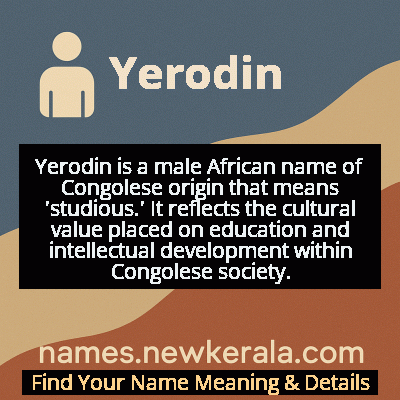Yerodin Name Meaning & Details
Origin, Popularity, Numerology Analysis & Name Meaning of Yerodin
Discover the origin, meaning, and cultural significance of the name YERODIN. Delve into its historical roots and explore the lasting impact it has had on communities and traditions.
Name
Yerodin
Gender
Male
Origin
African
Lucky Number
9
Meaning of the Name - Yerodin
Yerodin is a male African name of Congolese origin that means 'studious.' It reflects the cultural value placed on education and intellectual development within Congolese society.
Yerodin - Complete Numerology Analysis
Your Numerology Number
Based on Pythagorean Numerology System
Ruling Planet
Mars
Positive Nature
Generous, passionate, energetic, and humanitarian.
Negative Traits
Impulsive, impatient, moody, and can be overly emotional.
Lucky Colours
Red, maroon, scarlet.
Lucky Days
Tuesday.
Lucky Stones
Red coral, garnet.
Harmony Numbers
1, 2, 3, 6.
Best Suited Professions
Military, sports, philanthropy, leadership roles.
What People Like About You
Courage, energy, leadership, generosity.
Famous People Named Yerodin
Yerodin Mokolo
Community Leader
Founded educational programs for youth in Kinshasa
Yerodin Nzuzi
Academic Researcher
Published significant research on Central African linguistics
Yerodin Kabasele
Musician
Blended traditional Congolese music with contemporary styles while promoting educational themes
Name Variations & International Equivalents
Click on blue names to explore their detailed meanings. Gray names with will be available soon.
Cultural & Historical Significance
The name also represents the intersection of traditional African values with modern educational ideals. In Congolese families, bestowing the name Yerodin signifies a commitment to raising a child who will honor both cultural heritage and academic excellence. This naming practice reinforces the concept that knowledge is not just for personal benefit but serves the broader community. The cultural significance extends beyond individual families to represent Africa's intellectual contributions to global knowledge systems, challenging stereotypes about African educational attainment while celebrating indigenous wisdom traditions.
Extended Personality Analysis
Individuals named Yerodin typically exhibit a strong intellectual curiosity and a natural inclination toward learning and knowledge acquisition. Their studious nature often manifests as careful, analytical thinking and a methodical approach to problem-solving. These individuals tend to be deeply reflective, preferring to gather information and consider multiple perspectives before making decisions. Their love for learning frequently extends beyond formal education to include self-directed study and exploration of diverse subjects. Yerodins often demonstrate remarkable concentration and the ability to immerse themselves completely in complex tasks or studies.
In social contexts, Yerodins may appear somewhat reserved initially, but they form meaningful connections based on intellectual compatibility and shared interests. They are typically excellent listeners who value deep conversations over superficial small talk. Their studious disposition often makes them natural teachers and mentors within their communities, as they derive satisfaction from sharing knowledge and helping others learn. While they may not be the most outgoing personalities, their thoughtful insights and reliable judgment earn them respect among peers. The name's meaning often becomes a self-fulfilling prophecy, as those called Yerodin tend to embrace their identity as lifelong learners and knowledge-seekers.
Modern Usage & Popularity
In modern usage, Yerodin continues to be employed by Congolese families who wish to emphasize educational values while maintaining cultural connections. The name sees steady usage among urban, educated families in the Democratic Republic of Congo, particularly in cities like Kinshasa and Lubumbashi where academic achievement is highly valued. Among the Congolese diaspora in Europe and North America, Yerodin has gained some popularity as families seek names that honor their heritage while conveying positive attributes. While not ranking among the most common African names globally, its usage has shown gradual increase as awareness of meaningful African names grows. The name is particularly favored by parents working in education, academia, or professional fields where intellectual achievement is prized. Contemporary usage reflects a balance between preserving cultural identity and embracing the global importance of education.
Symbolic & Spiritual Meanings
Symbolically, Yerodin represents the illuminating power of knowledge and the transformative potential of education. The name serves as a metaphor for intellectual enlightenment, suggesting that learning can dispel ignorance much like light dispels darkness. It symbolizes the bridge between traditional wisdom and modern knowledge systems, embodying the idea that education honors ancestral values while advancing contemporary understanding. Yerodin also carries the symbolic weight of responsibility—the notion that those blessed with knowledge have a duty to use it for the benefit of their communities. In a broader cultural context, the name challenges stereotypes about African intellectual capacity while celebrating the continent's rich traditions of scholarship and learning. It stands as a symbolic affirmation that education is both a personal journey of growth and a communal resource that can uplift entire societies.

